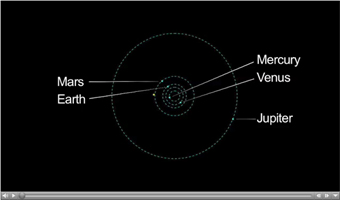
Click on the image for the animationThis movie shows asteroids observed so far by NASA's Wide-field Infrared Survey Explorer, or WISE. As WISE scans the sky from its polar orbit, more and more asteroids and comets are caught in its infrared vision. The mission has surveyed about three-fourths of the sky; however, data for only about 50 percent of the sky has been processed for asteroids and comets at this time.
The white dots show asteroids observed by WISE -- most of these are in the Main Belt between Mars and Jupiter, and some, the Trojans, orbit in front of, or behind, Jupiter. The red dots represent newfound near-Earth objects, which are asteroids and comets with orbits that come relatively close to Earth's path around the sun. The green dots are previously known near-Earth objects observed by WISE. The yellow squares show all comets seen by WISE so far.
As of May 24, 2010, WISE has seen more than 60,000 asteroids. It has observed more than 70 comets, 12 of which are new, and about 200 near-Earth objects, more than 50 of which are new.
WISE is an all-sky survey, snapping pictures of the whole sky, including everything from asteroids to stars to powerful, distant galaxies.
JPL manages WISE for NASA's Science Mission Directorate, Washington. The principal investigator, Edward Wright, is at UCLA. The mission was competitively selected under NASA's Explorers Program managed by the Goddard Space Flight Center, Greenbelt, Md. The science instrument was built by the Space Dynamics Laboratory, Logan, Utah, and the spacecraft was built by Ball Aerospace & Technologies Corp., Boulder, Colo. Science operations and data processing take place at the Infrared Processing and Analysis Center at the California Institute of Technology in Pasadena. Caltech manages JPL for NASA.
More information is online at http://www.nasa.gov/wise and http://wise.astro.ucla.edu.

